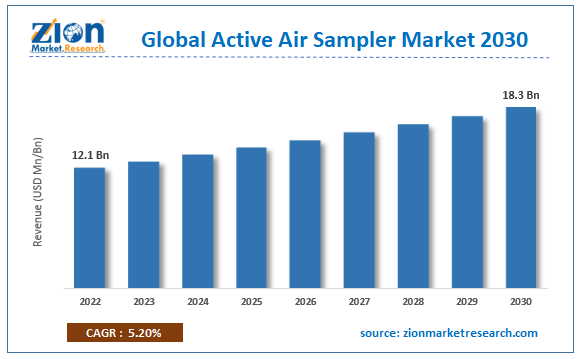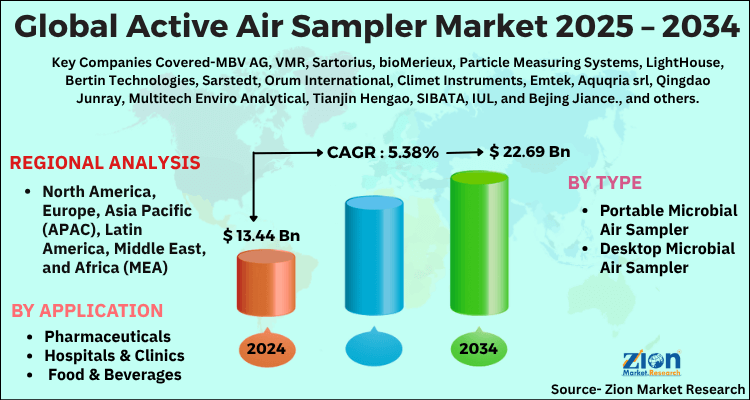Global Active Air Sampler Market Size, Share, Growth Analysis Report - Forecast 2034

Active Air Sampler Market By Type (Portable Microbial Air Sampler, Desktop Microbial Air Sampler), By Application (Pharmaceutical, Food & Beverage, Healthcare, Others), and By Region: Global and Regional Industry Overview, Market Intelligence, Comprehensive Analysis, Historical Data, and Forecasts 2025 - 2034
| Market Size in 2024 | Market Forecast in 2034 | CAGR (in %) | Base Year |
|---|---|---|---|
| USD 13.44 Billion | USD 22.69 Billion | 5.38% | 2024 |
Active Air Sampler Market: Industry Perspective
The global active air sampler market size was worth around USD 13.44 Billion in 2024 and is predicted to grow to around USD 22.69 Billion by 2034 with a compound annual growth rate (CAGR) of roughly 5.38% between 2025 and 2034. The report analyzes the global active air sampler market's drivers, restraints/challenges, and the effect they have on the demands during the projection period. In addition, the report explores emerging opportunities in the active air sampler industry.
The market report is an indispensable guide on growth factors, challenges, restraints, and opportunities in the global marketspace. The active air sampler market report covers the geographical market along with a comprehensive competitive landscape analysis. It also includes cash flow analysis, profit ratio analysis, market basket analysis, market attractiveness analysis, PESTEL analysis, SWOT analysis, Porter’s five force analysis, and value chain analysis. Additionally, the active air sampler industry report explores the investor and stakeholder space to help companies make data-driven decisions.
Active Air Sampler Market: Overview
An active air sampler enables active air sampling which is a key function of any quality control lab related to healthcare units, biotech centers, and pharmaceutical facilities. Moreover, active air sampling is done by counting living organisms for each cubic meter of air. According to NCBI, active air samplers allow the calculation of the number of particles per cubic meter of air by using volumetric methods such as the collection of samples with the help of impaction, impinging, filtering, virtual impaction, cyclone, and electrostatic attraction.
Key Insights
- As per the analysis shared by our research analyst, the global active air sampler market is estimated to grow annually at a CAGR of around 5.38% over the forecast period (2025-2034).
- Regarding revenue, the global active air sampler market size was valued at around USD 13.44 Billion in 2024 and is projected to reach USD 22.69 Billion by 2034.
- The active air sampler market is projected to grow at a significant rate due to Rising need for air quality monitoring in healthcare, pharma, and environmental applications fuels growth.
- Based on Type, the Portable Microbial Air Sampler segment is expected to lead the global market.
- On the basis of Application, the Pharmaceutical segment is growing at a high rate and will continue to dominate the global market.
- Based on region, North America is predicted to dominate the global market during the forecast period.
Active Air Sampler Market: Growth Factors
Key Growth Drivers:
The active air sampler market is propelled by increasing awareness of indoor air quality and its link to public health, which is driving demand across hospitals, laboratories, pharmaceutical manufacturing, and commercial buildings. Regulatory tightening and stricter air-monitoring standards for occupational safety, infection control, and product quality (especially in cleanrooms and pharmaceutical production) are pushing organizations to adopt reliable active sampling solutions. Technological improvements—such as real-time monitoring, higher sensitivity sensors, automation, and IoT connectivity—enhance usability and data integration, making active samplers more attractive. Finally, heightened focus on biosurveillance, pandemic preparedness, and environmental monitoring has created sustained demand for portable and fixed active air sampling systems.
Restraints:
High acquisition and maintenance costs of sophisticated active air samplers limit adoption among smaller clinics, laboratories, and facilities in emerging economies, where budget constraints are significant. The requirement for skilled technicians to perform sampling, interpret results, and maintain calibration reduces accessibility and increases operational overhead. Market fragmentation—many specialized products tailored to niche applications—can confuse buyers and slow procurement decisions. Additionally, variability in regulatory requirements and testing protocols across regions complicates standardization and can hinder cross-border sales and deployment.
Opportunities:
There are strong opportunities in expanding use cases such as indoor air quality monitoring in commercial real estate, schools, and public transportation, where growing occupant health concerns create new demand. Integration with AI and cloud analytics presents opportunities to offer value-added services—predictive maintenance, trend analysis, and automated compliance reporting—that differentiate suppliers and generate recurring revenue. Emerging markets investing in healthcare and industrial infrastructure represent untapped demand for cost-effective and ruggedized samplers. Innovations in miniaturization and low-power designs also open pathways to consumer-facing and smart-building air quality solutions.
Challenges:
A key challenge is ensuring analytical accuracy and reproducibility across diverse environmental conditions and particle types, because inconsistencies erode trust in results and can lead to regulatory disputes. Intense competition from low-cost passive samplers and alternative monitoring technologies forces suppliers to continuously innovate while protecting margins. Data security and privacy concerns emerge as samplers become networked, requiring robust cybersecurity and compliance efforts. Finally, long sales cycles in regulated industries and the need for validation and certification prior to purchase can slow commercialization and scale-up of new products.
Active Air Sampler Market: Segmentation
The global active air sampler market is segmented based on Type, Application, and region. All the segments have been analyzed based on present and future trends and the market is estimated from 2025 to 2034.
Based on Type, the global active air sampler market is divided into Portable Microbial Air Sampler, Desktop Microbial Air Sampler.
On the basis of Application, the global active air sampler market is bifurcated into Pharmaceutical, Food & Beverage, Healthcare, Others.
The Regional, this segment includes the current and forecast demand for North America, Europe, Asia Pacific, Latin America,and the Middle East and Africa.
Active Air Sampler Market: Report Scope
| Report Attributes | Report Details |
|---|---|
| Report Name | Active Air Sampler Market |
| Market Size in 2024 | USD 13.44 Billion |
| Market Forecast in 2034 | USD 22.69 Billion |
| Growth Rate | CAGR of 5.38% |
| Number of Pages | 214 |
| Key Companies Covered | MBV AG, VMR, Sartorius, bioMerieux, Particle Measuring Systems, LightHouse, Bertin Technologies, Sarstedt, Orum International, Climet Instruments, Emtek, Aquqria srl, Qingdao Junray, Multitech Enviro Analytical, Tianjin Hengao, SIBATA, IUL, and Bejing Jiance., and others. |
| Segments Covered | By Type, By Application, and By Region |
| Regions Covered | North America, Europe, Asia Pacific (APAC), Latin America, The Middle East and Africa (MEA) |
| Base Year | 2024 |
| Historical Year | 2020 to 2023 |
| Forecast Year | 2025 - 2034 |
| Customization Scope | Avail customized purchase options to meet your exact research needs. Request For Customization |
Active Air Sampler Market: Regional Insights
North America remains a leading market for active air samplers due to strong regulatory enforcement, extensive indoor air quality monitoring in commercial and healthcare facilities, and robust R&D activities that drive technological innovation. Europe shows steady demand driven by stringent air quality and occupational safety regulations, wide adoption in industrial and environmental monitoring, and growing investments in smart building technologies. The Asia-Pacific region is the fastest-growing market, propelled by rapid industrialization, urbanization, rising awareness of air pollution, expanding healthcare infrastructure, and increasing deployment of monitoring solutions in manufacturing and public spaces.
Latin America is witnessing gradual uptake supported by infrastructure development, growing environmental monitoring initiatives, and rising investments in public health surveillance. The Middle East & Africa market is expanding with increased adoption in oil & gas, petrochemical, and border security applications, alongside growing government spending on environmental monitoring and workplace safety.
Active Air Sampler Market: Competitive Analysis
The report provides a company market share analysis to give a broader overview of the key market players. In addition, the report also covers key strategic developments of the market, including acquisitions & mergers, new product launches, agreements, partnerships, collaborations & joint ventures, research & development, and regional expansion of major participants involved in the active air sampler market on a global and regional basis.
The global active air sampler market profiles key players such as:
- MBV AG
- VMR
- Sartorius
- bioMerieux
- Particle Measuring Systems
- LightHouse
- Bertin Technologies
- Sarstedt
- Orum International
- Climet Instruments
- Emtek
- Aquqria srl
- Qingdao Junray
- Multitech Enviro Analytical
- Tianjin Hengao
- SIBATA
- IUL
- Bejing Jiance
The global active air sampler market is segmented as follows:
By Type
- Portable Microbial Air Sampler
- Desktop Microbial Air Sampler
By Application
- Pharmaceuticals
- Hospitals & Clinics
- Food & Beverages
- Others
By Region
- North America
- The U.S.
- Canada
- Europe
- France
- The UK
- Spain
- Germany
- Italy
- Rest of Europe
- Asia Pacific
- China
- Japan
- India
- South Korea
- Southeast Asia
- Rest of Asia Pacific
- Latin America
- Brazil
- Mexico
- Rest of Latin America
- Middle East & Africa
- GCC
- South Africa
- Rest of Middle East & Africa
Table Of Content
Methodology
FrequentlyAsked Questions
An active air sampler enables active air sampling which is a key function of any quality control lab related to healthcare units, biotech centers, and pharmaceutical facilities. Moreover, active air sampling is done by counting living organisms for each cubic meter of air. According to NCBI, active air samplers allow the calculation of the number of particles per cubic meter of air by using volumetric methods such as the collection of samples with the help of impaction, impinging, filtering, virtual impaction, cyclone, and electrostatic attraction.
The global active air sampler market is expected to grow due to Rising need for air quality monitoring in healthcare, pharma, and environmental applications fuels growth.
According to a study, the global active air sampler market size was worth around USD 13.44 Billion in 2024 and is expected to reach USD 22.69 Billion by 2034.
The global active air sampler market is expected to grow at a CAGR of 5.38% during the forecast period.
North America is expected to dominate the active air sampler market over the forecast period.
Leading players in the global active air sampler market include MBV AG, VMR, Sartorius, bioMerieux, Particle Measuring Systems, LightHouse, Bertin Technologies, Sarstedt, Orum International, Climet Instruments, Emtek, Aquqria srl, Qingdao Junray, Multitech Enviro Analytical, Tianjin Hengao, SIBATA, IUL, and Bejing Jiance., among others.
The report explores crucial aspects of the active air sampler market, including a detailed discussion of existing growth factors and restraints, while also examining future growth opportunities and challenges that impact the market.
HappyClients
Zion Market Research
Tel: +1 (302) 444-0166
USA/Canada Toll Free No.+1 (855) 465-4651
3rd Floor,
Mrunal Paradise, Opp Maharaja Hotel,
Pimple Gurav, Pune 411061,
Maharashtra, India
Phone No +91 7768 006 007, +91 7768 006 008
US OFFICE NO +1 (302) 444-0166
US/CAN TOLL FREE +1 (855) 465-4651
Email: sales@zionmarketresearch.com
We have secured system to process your transaction.
Our support available to help you 24 hours a day, five days a week.
Monday - Friday: 9AM - 6PM
Saturday - Sunday: Closed






